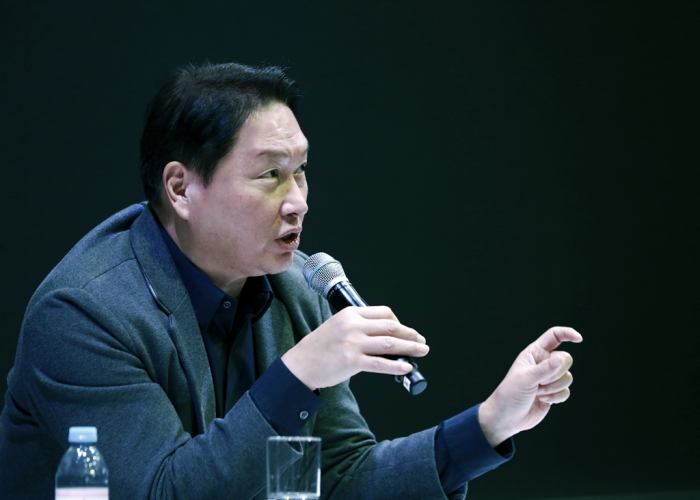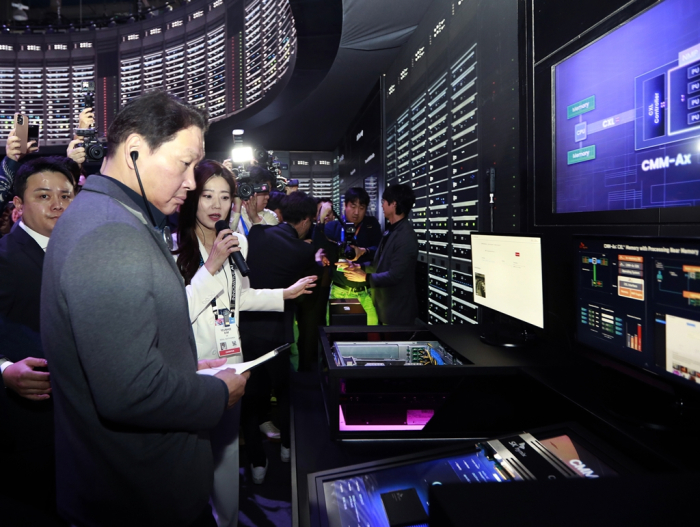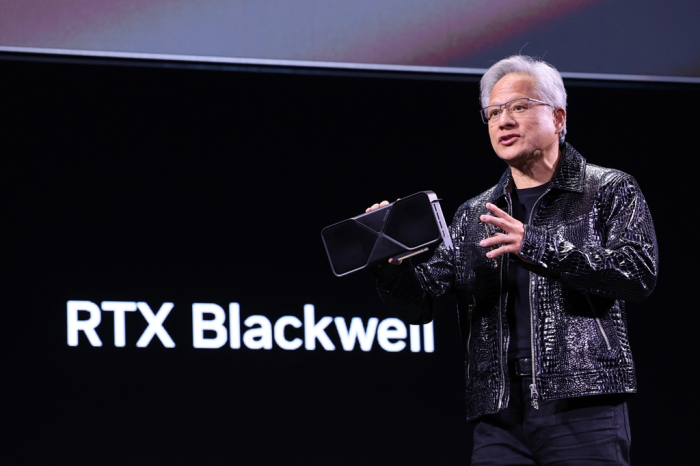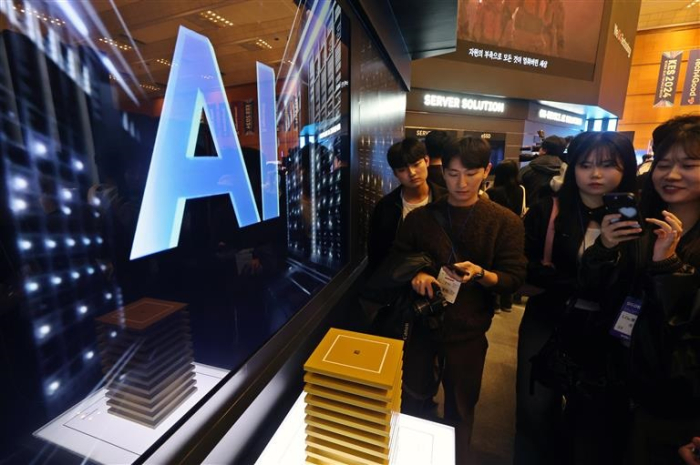SK Hynix to collaborate with Nvidia on Cosmos physical AI platform: Chey
The SK Group chairman says SK Hynix's HBM chip development speed is ahead of Nvidia’s specification requests
By Jan 09, 2025 (Gmt+09:00)
LG Chem to sell water filter business to Glenwood PE for $692 million


KT&G eyes overseas M&A after rejecting activist fund's offer


Kyobo Life poised to buy Japan’s SBI Group-owned savings bank


StockX in merger talks with Naver’s online reseller Kream


Meritz backs half of ex-manager’s $210 mn hedge fund



LAS VEGAS – SK Hynix Inc., the world’s second-largest memory chipmaker, has agreed to collaborate with Nvidia Corp. on the top US AI chip designer’s Cosmos platform that’s designed to advance the development of physical AI systems.
Chey Tae-won, chairman of SK Group, the parent of the Korean chipmaker, said he discussed ways to deepen AI cooperation between the two partners with Nvidia Chief Executive Jensen Huang during their meeting on Wednesday.
“Huang talked about Korea’s strength in manufacturing technology. He expressed his wish to collaborate with us on advancing the Cosmos platform,” Chey said at a press conference with Korean reporters in Las Vegas on the sidelines of CES 2025.
At their meeting, Chey told Huang that Korea, a manufacturing powerhouse, is uniquely positioned to work with Nvidia on that front.
The two companies agreed to further discuss their Cosmos platform collaboration, he said.

At the consumer electronics show on Monday, Nvidia introduced the Cosmos platform, which includes generative world foundation models, designed to advance the development of physical AI systems such as autonomous vehicles and robots. The platform consists of new state-of-the-art models, video tokenizers and an accelerated data processing pipeline optimized for Nvidia data center GPUs.
Unlike software AI such as ChatGPT, physical AI focuses on decision-making for physical tasks such as picking up or moving objects.
SK’S HBM DEVELOPMENT SPEED AHEAD OF NVIDIA’S REQUESTS
The two leaders discussed SK Hynix’s high-bandwidth memory (HBM) chips, which work with Nvidia’s AI accelerators. Chey said the Korean company has been quickening its pace of development to ensure it can keep up with Nvidia’s demands for faster evolution.

“We talked about accelerating the development of SK’s HBM and Nvidia’s graphics processing units. In the past, Nvidia used to ask us to develop HBM chips faster to meet their specifications, but recently, SK’s AI chip development speed has exceeded NVIDIA’s requests,” he said.
HBM, an advanced high-performance memory chip, is a crucial component of Nvidia GPUs that drive generative AI systems.
SK Hynix is the top HBM supplier to Nvidia with its industry-leading fifth-generation HBM3E chips.
The Korean chip giant earlier said its planned 2025 production of HBM was sold out, with Nvidia its biggest customer.
SK currently supplies 12-layer HBM3E products to Nvidia. It plans to supply samples of 16-layer HBM3E chips in the first half and unveil 12-layer HBM4 products in the second half.

It became the leading provider of HBM memory to Nvidia during the post-ChatGPT AI boom, pushing aside longtime rival Samsung Electronics Co.
TO EXPAND AI DATA CENTER BUSINESS
SK Group also focuses on AI data centers to drive future growth, part of a strategy to transform Korea’s second-biggest conglomerate into a technology-driven business.
“Energy solutions for AI data centers are critical,” Chey said, citing key business areas such as power supply, energy efficiency and cooling. “In this regard, the AI data center business aligns closely with SK's business portfolio.”
Given the enormous power demand of AI data centers, SK sees significant business opportunities in optimizing energy supply and reducing power consumption, he said.
Write to Sang-Hoon Sung at uphoon@hankyung.com
In-Soo Nam edited this article.
-
 BatteriesLotte to supply advanced copper foil to Doosan for Nvidia’s Blackwell
BatteriesLotte to supply advanced copper foil to Doosan for Nvidia’s BlackwellDec 17, 2024 (Gmt+09:00)
3 Min read -
 Korean chipmakersNvidia asks SK Hynix to bring forward HBM4 supply by 6 months
Korean chipmakersNvidia asks SK Hynix to bring forward HBM4 supply by 6 monthsNov 04, 2024 (Gmt+09:00)
2 Min read -
 Korean chipmakersSK Hynix chief says no delay in 12-layer HBM3E supply as demand soars
Korean chipmakersSK Hynix chief says no delay in 12-layer HBM3E supply as demand soarsOct 23, 2024 (Gmt+09:00)
3 Min read -
 Korean chipmakersSamsung, SK Hynix up the ante on HBM to enjoy AI memory boom
Korean chipmakersSamsung, SK Hynix up the ante on HBM to enjoy AI memory boomSep 04, 2024 (Gmt+09:00)
3 Min read -
 EarningsSK Hynix to supply 12-layer HBM3E to Nvidia in Q4; profit soars in Q2
EarningsSK Hynix to supply 12-layer HBM3E to Nvidia in Q4; profit soars in Q2Jul 25, 2024 (Gmt+09:00)
3 Min read -
 Mergers & AcquisitionsRebellions-Sapeon Korea merger to challenge Nvidia’s AI chip dominance
Mergers & AcquisitionsRebellions-Sapeon Korea merger to challenge Nvidia’s AI chip dominanceJun 12, 2024 (Gmt+09:00)
4 Min read -
 Leadership & ManagementSK Group’s Chey Tae-won heads to Europe, seeks AI partnerships at MWC
Leadership & ManagementSK Group’s Chey Tae-won heads to Europe, seeks AI partnerships at MWCFeb 13, 2024 (Gmt+09:00)
2 Min read -
 Corporate strategySK Chairman Chey vows to turn Ulsan into green energy, AI hub
Corporate strategySK Chairman Chey vows to turn Ulsan into green energy, AI hubSep 15, 2023 (Gmt+09:00)
2 Min read


